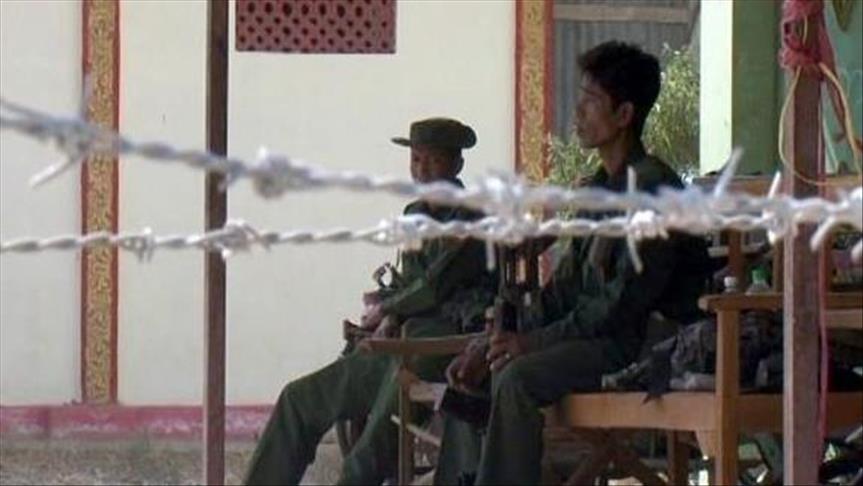12 men jailed for training with 'Myanmar Muslim Army'
Defense lawyers have suggested government has invented organization to justify persecution of Muslims

Yangon
By Joshua Carroll
YANGON, Myanmar
A group of Muslim men have been jailed in Myanmar for receiving training from an organization prosecutors refer to as the “Myanmar Muslim Army” -- a collective defense lawyers and security experts have suggested does not even exist.
The Myanmar Times reported Tuesday that the 12 men -- who are between 19 and 54 years old -- were given five year jail terms Monday at Aung Myay Thar San township court in Mandalay after being arrested and detained between late last year.
They were charged under section 5J of the Emergency Provisions Act, which makes it illegal to "affect the morality or conduct of the public in a way that would undermine the security of the Union".
A lawyer working with an international human rights organization immediately slammed the verdict, accusing the court of staging an unfair trial and saying the defendants were tortured into confessions.
“This is injustice. There was clearly no evidence to support this verdict,” Matthew Bugher, a consultant to Fortify Rights who has been monitoring the trial, said in a statement.
“This sentence reveals the lack of justice, accountability and fair process in the current government and the court system.”
Phil Robertson, deputy Asia director for Human Rights Watch, told Anadolu Agency on Tuesday that the men should “be released immediately on grounds that they didn't receive a free or fair trial”.
Fortify Rights has said that the prosecution refused to provide concrete evidence of the alleged network, or the men associated with it, instead repeatedly citing the Official Secrets Act.
Defense lawyers for the men -- along with security experts have -- suggested that the government has invented the organization to suggest a threat from a terrorist outfit to justify its persecution of Muslims.
In a statement Sunday, Fortify Rights claimed that authorities had tortured the defendants.
"Justice can’t prevail when torture is tolerated," said Matthew Smith, Fortify Rights' executive director.
"This trial will be tainted until these allegations are properly addressed and fair trial standards are fulfilled."
Fortify Rights said Soe Moe Aung, 24, had testified at a Sept. 17 hearing that authorities had beat him in detention, deprived him of food and water, fed him pills, and administered unknown injections for around one week.
The brother of defendant U Nyi Nyi told the Times that two of his brothers -- both religious teachers -- have faced jail time in connection to supposed armed groups -- charges he said he believes are completely ungrounded.
“My brothers are not guilty. They are very kind people,” he said.
Little is known of the Myanmar Muslim Army outside of a brief mention in a 2015 Rajaratnam School of International Studies (RSIS) report, in which Rohan Gunaratna writes of "unconfirmed reports about the emergence of a new group called Myanmar Muslim Army (MMA), which is reportedly using Thai territory for training Myanmar Muslims".
The existence of the group is yet to be confirmed by human rights groups, terrorism experts, or the U.S. State Department.
“The so-called Myanmar Muslim Army remains as much of a mystery after this trial in Mandalay as before it,” Robertson said. “But what’s clear is the government failed to provide sufficient evidence that these twelve men had anything to do with that group.”
In a Nov. 2003 report titled Burma and International Terrorism by the Australian Institute of Policy and Science, Andrew Selth suggests that there may be some truth in the claim that the Myanmar Muslim Army is a fabrication.
"Since September 2001, the Rangoon regime has sought to use the rubric of the global war against terrorism to cloak a renewed campaign of discrimination against Burma's broad Muslim population," he wrote.
Myanmar's Muslim minority consists mostly of Rohingya, who have faced widespread persecution for decades, but their situation has become ever more perilous since sectarian violence erupted in 2012.
Many Muslims were not allowed to stand in the Nov. 8 election on dubious citizenship grounds, and hundreds of thousands of Rohingya were also unable to vote because the government bowed to calls from ultra-nationalists to exclude them.
Anadolu Agency website contains only a portion of the news stories offered to subscribers in the AA News Broadcasting System (HAS), and in summarized form. Please contact us for subscription options.

